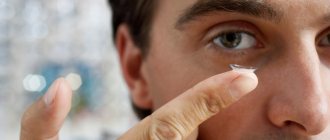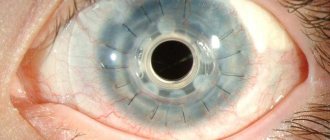Incredible facts
Although it is known that blinking protects our eyes from dust and other foreign particles, scientists have found that blinking has another - psychological function.
.
The average person blinks 15-20 times per minute
, that is, our eyes are closed 10 percent of the time we are awake. Blinking moisturizes and protects the eyeball, but we blink much more often than necessary to perform these functions.
A group of Japanese researchers recently made an unexpected discovery: quickly closing our eyes helps us gather our thoughts and focus.
on what is happening around.
They came to this conclusion after noticing one interesting fact: the moments when we blink do not occur by chance.
. Although we seem to do it spontaneously, research shows that people blink at expected times.
- If we read, then, as a rule, we blink after the sentence has ended.
— If we listen to someone speak, we often blink when the speaker pauses between statements.
- If a group of people watches the same video, then they blink at almost the same time, when the actions are delayed for a short time.
As a result, scientists have found that we subconsciously begin to blink in order to mentally relax
, turn off visual stimuli and focus your attention.
To test this, the scientists recruited 10 different volunteers who underwent functional magnetic resonance imaging and watched the television show "Mr. Bean." The researchers looked at which areas of the brain showed increased and decreased activity during blinking.
An analysis of the study found that when participants blinked, there was an increase in brain activity in an area called the passive mode network. It works when we are in a state of waking rest and serves as a break that allows us to increase our attention
after we open our eyes again.
Frequent blinking in adults
- Emotional and psychological. People may blink frequently to add emphasis to words. It has also been observed that a person blinks frequently if he experiences severe emotional or physical fatigue.
This is interesting! A person lying on the move, in the absence of training, begins to blink quickly and unconsciously. And if a person is trained, then an uncontrollable desire to blink appears after consciously stopping the reflex during relaxation.
- Dry eyes. Dry air or wind can cause this condition. Also, prolonged work at the computer can also cause dryness and, as a result, frequent blinking.
- The appearance of diseases of the visual apparatus such as barley, conjunctivitis, keratitis or other diseases.
- Tiki. This disease appears as a result of chronic neuroses. There are two types of nervous tics: primary and secondary. With primary tics, childhood disorders of the nervous system return. Secondary tic is associated with impaired brain activity.
- Lack of vitamins and minerals, metabolic problems, hormonal imbalances.
- Tourette's syndrome. In this case, frequent blinking occurs along with uncontrollable sounds and obscene words. In this case, you need to contact a neurologist.
- Alcoholism, drug addiction, smoking.
- Negative reactions to taking medications.
- Allergy.
- Reaction to bright light. Under the influence of light and irritation of the mucous membrane of the eye, increased blinking begins.
Signs of lying by gestures
Fidgeting and nervousness
We can all feel restless or a little nervous from time to time. But if the nervousness of your interlocutor is too obvious, then this may be a clear sign that this is a liar.
While fidgeting, he can perform many different actions, indicating that the person is currently lying.
For example, a liar straightens his clothes, loosens his tie, fiddles with jewelry, tucks locks of hair behind his ear, wipes his glasses, fidgets with his fingers, cleans his nails, straightens his notebook, twirls a pencil, or wipes sweat from his forehead.
All these actions and some others indicate that the person is currently uncomfortable due to the fact that he is telling a lie.
Increased blinking in children
Photo 2: If a child has difficulty communicating with his peers or gets lost in the presence of adults, all this negatively affects his nervous system and is manifested by frequent blinking. Source: flickr (momof4mejias).
- Entry of a foreign body into the child's organ of vision.
- Decreased visual acuity. In this case, the child will squint to focus while looking at the object.
- Dry eyes. Spending a long time at the computer or in front of the TV can lead to this problem.
- Eye strain. If a child’s eyes experience tension as a result of heavy workload at school, extensive homework, or spending long periods of time in front of a computer or TV, he begins to blink frequently.
- Blepharitis. This disease may appear as a result of a lack of vitamins, problems with the gastrointestinal tract or other diseases that are accompanied by decreased immunity.
- Styes, conjunctivitis, keratitis or other eye diseases.
- Allergic reaction.
- Tiki. If the cause of frequent blinking in children is nervous tics, then you should immediately contact a neurologist to find out the cause of the tics.
- Psychological problems. Excessive criticism from adults negatively affects the child's psyche, which can manifest itself through frequent blinking.
Note! Eye blinking can occur in up to 18% of children at some point in their development. If such a tic goes away within a year, then in this case there is a “transitional” condition that does not need to be treated by the child.
Signs of lying by voice
Change in voice
Depending on the situation, a liar is able to change the intonation in his voice. He may speak quickly or suddenly slow down, speak quietly or raise his tone, or speak louder than usual.
It is likely that a liar will begin to stutter
when trying to remember details. If he tells the truth, he is able to remember the necessary information without much effort.
What to do
If the cause of frequent eye blinking is normal fatigue, then you need to arrange a good rest for yourself and get a good night's sleep. With a very intense work rhythm, it is necessary to properly organize the day. Get up 30-40 minutes earlier and do a little exercise for your body. It is very important to go to bed on time, no later than 22:00. This daily routine will allow you to spend your energy more properly and stop excessive overwork.
If your eyesight is dry, leading to excessive blinking, you should limit the time you spend at the computer or in front of the TV. When working at the computer for long periods of time, take short breaks for yourself. While resting, close your eyes for a couple of minutes and let them rest.
If the cause of frequent blinking is bright light, then you need to eliminate the source of bright light. This can be either bright sunlight or bright artificial lighting.
If your child is very tired at school or due to extensive homework, which leads to frequent blinking, then take active walks in the fresh air for the child. Such walks will help relieve tension and stop frequent blinking.
If you notice that you are overly critical of your child and set high demands for him, become softer and more condescending to him during communication. Don't punish for small things and don't judge harshly for mistakes. After all, no adult is immune from mistakes. Praise your child at every opportunity and support him.
Note! If you see that the child is blinking intensely, then you do not need to focus his attention on blinking. This will only make the situation worse. Better give him a glass of water to drink and help him relax.
If any other reasons lead to discomfort, then you need to visit an ophthalmologist for diagnosis and treatment.
Why is this happening
Increased blinking can be a reaction to bright light, especially if we leave a dark room and immediately find ourselves in a brightly lit room or outside on a sunny, clear day.
The frequency is individual for each person, so the above figures are averages.
Although Japanese scientists were able to identify some dependence of blinking on a specific situation, which is typical for almost all people.
Blinking follows:
- if we focus on some thought (at this moment it becomes more frequent);
- when reading, when we read to the end of a line or sentence;
- when talking to someone after completing a phrase (during a pause).
All of the above points are the norm.
Homeopathic treatment
The following homeopathic remedies are used in the treatment of eye diseases:
- Sepia , Staphysagria, Aurum metallicum . These remedies are successfully used for styes on the eye and inflammation of the eyelids.
- Euphrasia officinalis helps with conjunctivitis and relieves tearing.
- Belladonna , Arnica, Arsenicum album help with acute conjunctivitis.
- Pulsatilla and Ignatia are used if chronic conjunctivitis is present.
- Mercurius solubilis is prescribed for purulent conjunctivitis and blepharitis
- Magnesia muriatica and Arsenicum are prescribed for blepharitis.
- Ruta (Ruta graveolens) is used for eye strain.
- Oculoheel is a remedy used for dry mucous membranes, excessive eye fatigue and conjunctivitis.
Get rid of tics with exercises
01.12.2018
Frequent eye blinking in adults occurs for several reasons. Under natural conditions, this is considered a process during which the mucous membrane of the eye is moisturized and supplied with oxygen.
Motor eye activity helps relax muscles and relieve tension:
- Raise your eyeballs up and down 20 times.
- Move your eyes left and right 20-30 times.
- Rotational movements - alternately do a circular review clockwise and counterclockwise 10 times.
- Rest - close your eyes with your palms for 30-40 seconds, let your eyes completely plunge into darkness. Then open your eyes and look into the distance for the same amount of time. Repeat 5-7 times.
- Alternation - blink your eyes 10-12 times, then close and relax for 35-40 seconds. Do 5-6 times.
Principles of psychotherapy, practical advice
– Do not focus the child’s attention on blinking, as this only aggravates the situation.
– Try to minimize situations that lead to stress and make sure he gets enough sleep, as stress and fatigue make the condition worse.
– If you notice that your child blinks frequently, try to relax him. Sit him in a comfortable position and ask him to close his eyes. Read him a book, tell him a story, or play a game.
– Give your child more water when he blinks. Offer him some snacks, such as carrots or crackers, and avoid sugary drinks.
– Zinc supplements strengthen the immune and nervous systems. Check with your doctor before giving them to your child.
– Consult an ophthalmologist to rule out problems such as an ingrown eyelash, abrased cornea, conjunctivitis, dry eyes or other causes.
The main percentage of success in treating eye tics depends on the parents and environment. The child’s problem should be treated with understanding. You cannot give him comments and demand that he stop making such spontaneous movements. The child does not grimace or misbehave; he does this unconsciously due to a neurological problem.
To minimize tics and achieve remission, you should:
- support the child;
- maintain a normal climate at home;
- protect from watching TV, spending time on the computer, on the phone;
- keep your child busy with new and interesting activities more often (in a state of interest, tics decrease);
- consider the child;
- do not insult or harm the child.
Children should not be pulled down because of a tic or compared with others. Adults should take an observant position and calmly wait for the effect of medication and alternative treatment.
Why does a child blink his eyes often: causes and treatment methods
Exposure to certain methods for tic disorders enhances the beneficial effect in combination with the main methods of treatment, and sometimes is sufficient to get rid of nervous tics.
Alternative methods include:
- Massage treatments for the head, arms and legs for the purpose of relaxation in case of chronic fatigue and overwork. Improving blood supply to muscles and relieving increased tone reduces the excitability of the central nervous system. It is enough to do 10 sessions to improve the patient’s condition.
- Acupuncture. The ancient Chinese method is based on the impact of needles on certain areas of the human body. Acupuncture is based on ancient ideas about the concentration of vital energy on certain meridians of the human body.
- Electrosleep. A common and accessible method of reducing nervous excitability and normalizing mental state. Conducting low-frequency impulses to the brain is absolutely safe.
- Special exercises. A non-standard approach is effective if the eye twitches. Treatment is carried out independently.
- Charging begins with frequent blinking, then sharp squinting. The alternation of these phases is carried out until tears appear. Wetting the eyes is useful for relaxing the muscle and relieving tension. When fatigue sets in, you can close your eyes and rest.
A timely visit to a neurologist for consultation will help eliminate the tic. The specialist determines what to do to get rid of the disorder after diagnosing the disorder and assessing the person’s psycho-emotional state.











